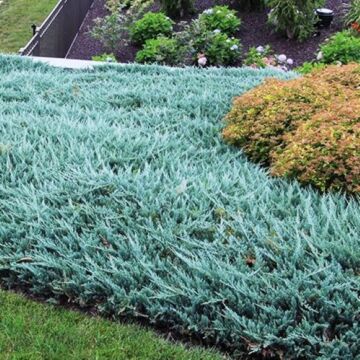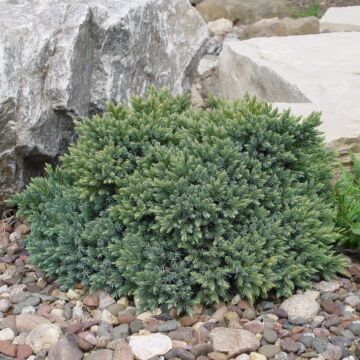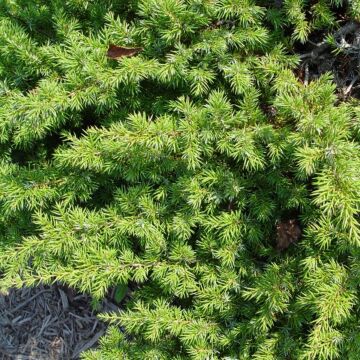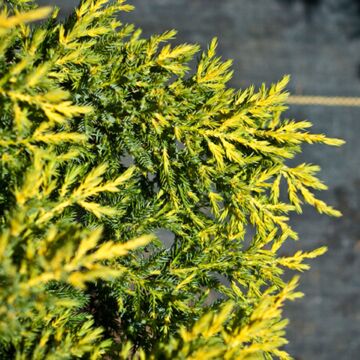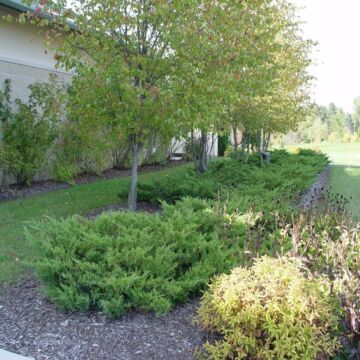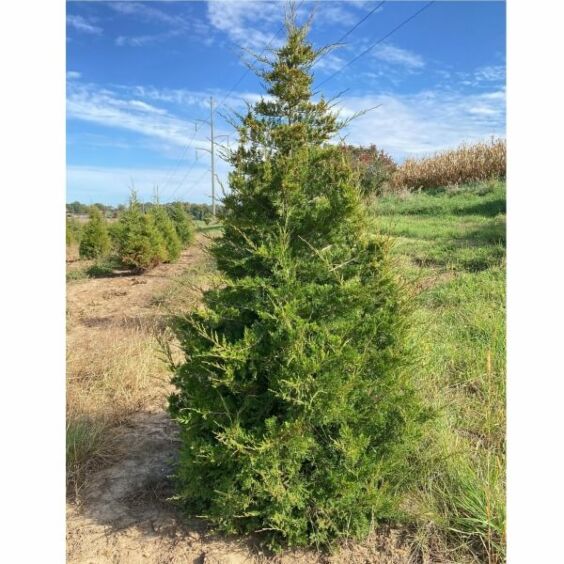
Growing zones
See Zone Map >Status: In stock
*Does not ship to California*
- Sun, Part Sun/Shade
Mature Plant Size (H x W): 20-40' x 10-20'
- Attracts Birds
- Deer Resistant
- Drought Tolerant
- Native
- Winter Interest
- Stone Mulch
- Walnut Toxicity Resistant
- Edible to People
- Cut Flower
- Hedges & Screens
Planting & Care for Eastern Redcedar Upright Junipers
Preparation
- Red Cedar is easily grown in average, dry to moist, well-drained soils in full sun. They tolerate a wide range of soils and growing conditions, from swamps to dry rocky glades. Prefers moist soils but is intolerant of constantly wet soils.
- It is a broadly conical, sometimes columnar, dense, evergreen conifer with horizontal branching .
- Use this evergreen as a narrow landscape accent/specimen, screens, or windbreaks.
- Red Cedar has the best drought resistance of any conifer native to the eastern US.
Opening Plant Material
- B&B - Soak root ball very well. Dig a hole at least 6" wider and no deeper than the size of the ball on the plant. Rotate the plant to the proper position. Never lift or move trees by the tops.
Containers - Completely saturate all container plants by putting them in a larger container of water until it stops bubbling. Remove. Now your Red Cedar is ready to plant. Dig a hole no deeper than the depth of the container and 6" or more, making sure it’s wider on the sides.
Planting B&B Trees
- Plant B&B Red Cedar trees in spring or fall. A good indicator if you can still plant is if the ground is still workable, you’re good to go. If a hard frost is expected be sure to hold off on planting.
- Notice where the base of the trunk flairs out from the tree. This is called the root flair. This root flair should show when the tree is planted. If necessary, add soil under the ball so the root flair is exposed.
- Place fertilizer packets into the bottom of the hole (if purchased). *Use our recommended fertilizer.
- Backfill ½ of the hole with soil and completely saturate the soil with water.
Once the tree is straight and located as desired, cut and remove twine. Then, remove or bend back top of metal basket. Lastly, remove the exposed burlap from the top of the ball. - Fill the hole to the top of the ball with soil, then soak well with water and let settle.
The top of the root ball should be visible and slightly higher than the soil around it.
Add mulch on top of the soil, making sure to not put mulch against the trunk or stems. - See our Handling & Planting Guidelines for illustrations on planting.
Planting Containers
- Slide the Red Cedar from the pot by tapping on the bottom of the pot.
- With a shovel or knife, trim the bottom 2" off the root ball for plants in plastic containers.
- Rotate the plant to the proper position. Never lift or move plants by the tops.
Place the root ball in the hole. - Notice where the base of the trunk flairs out from the Red Cedar. This is called the root flair. This root flair should show when the tree is planted. If necessary, add soil under the ball so the root flair is exposed.
- Place fertilizer packets into the bottom of the hole (if purchased). *Use our recommended fertilizer.
- Backfill the hole with soil, making sure the top of the root ball is visible and slightly higher than the soil around it.
- Firm the soil around the plant. Water well to settle soil around the root ball.
Pruning - After Planting
- Although it is not essential for B&B or grow bags/containers to be pruned after planting, a light pruning for shape, to remove any broken branches from shipping, or to thin out a heavily branched plant will help in the transplanting process and in the appearance of your new planting.
Pruning - Throughout the Season
- You can prune back broken or dead branches from your Red Cedar, but overall, it’s a low-maintenance plant.
Watering - After Planting
- Plants typically take approximately 6 weeks to establish new roots in your soil. During this period, water plants as often as every 2–4 days at the start and at least a minimum of once per week.
- Beyond the 6-week establishment period, water once per week unless rains occur.
- Stick your finger into the soil around 3” to check soil moisture.
Watering - Throughout the Season
- After the first season, plants should only be watered during extended periods without rain.
- How do you know if your plants need water? The easiest way to tell is to touch the soil around the roots. If it is moist, there is no need to water. If it is dry, give it a good soaking with the hose end (no nozzle) watering the soil only, not the leaves.
- Stick your finger into the soil around 3” to check soil moisture.
Planting & Handling Help
Download our Planting and Handling Guide below to plan for a successful arrival and install of your plants. Be sure to water all plants as soon as they arrive and every day until you’re ready to plant. Keep any bare root bundles in a shady, cool spot with the roots covered at all times.
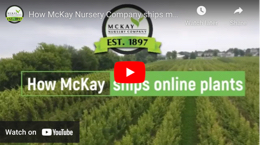

Learn More
Watch our videos on handling bare root plants, how your order is prepared for shipment and more.
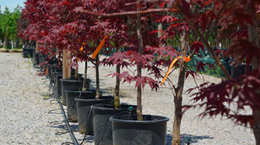

Plant Sizing
What is the difference between Containers, Grow Bags, Bare Root, and Balled & Burlap (B&B)?
Shipping Times
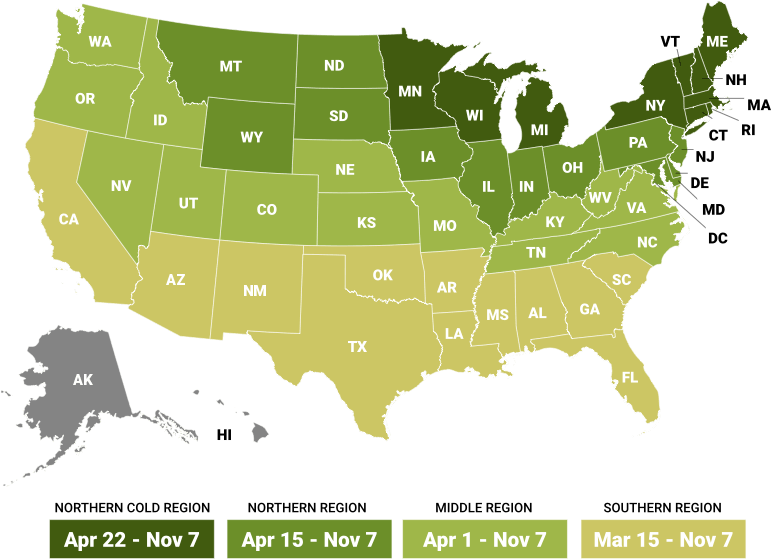

Our FedEx and local shipping times depend on two factors, one is by the region and the second is the type of product being shipped. For example, small fruits are only shipped in spring, but majority of our perennials are shipped from spring until fall. Keep in mind the dates below act as a general guide. Due to unpredictable weather, staffing, inventory and industry demands these timelines can change. Therefore, we cannot guarantee any of these times.
Shipping Dates by Region*
Northern Cold Region: April 22nd - November 7th
Northern Region: April 15th - November 7th
Middle Region: April 1st - November 7th
Southern Region: March 15th - November 7th
Local Delivery (small radius from Waterloo, WI): April 22nd - November 7th
Shipping Dates by Season*
Spring Shipping: Region Start Date (above) - May
Fall Shipping: September - November
Due to unpredictable weather, these times may vary. Some varieties are exceptions due to heat and plant health reasons. Enter your shipping zip code at the top of this page and be sure to check the shipping information on each product before you add it to your cart. If the product is too large or restricted in your state, you will not be able to checkout with that item in your cart.

